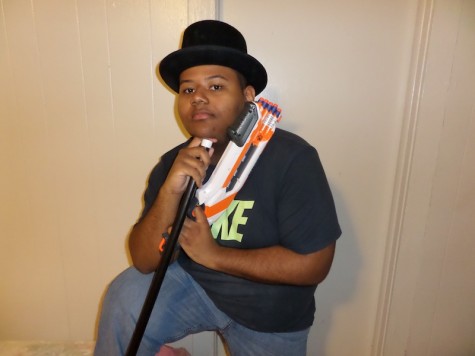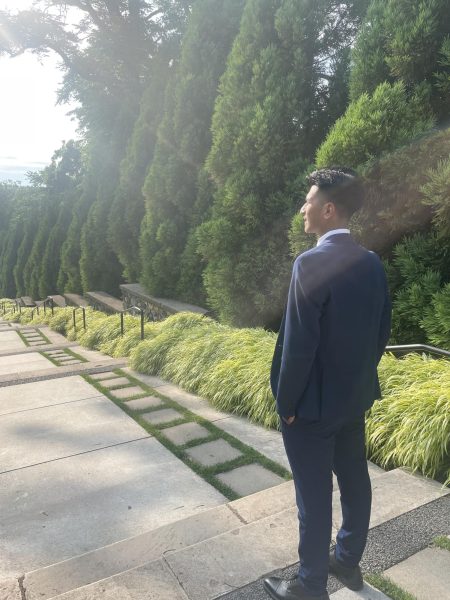The Army, and a Lifelong Sense of Balance

December 13, 2015
Angel Peña was on an Army mission to raid a bomb factory when the car exploded. The car had driven over two bombs called pressure plate IEDs, or improvised explosive devices, that were buried under ground, and in an instant, they claimed two of the four lives of those in the car. Peña was alongside his platoon leader, First Lieutenant Michael Cleary, just two years older than himself, and ten days from going home. He didn’t know he would never have the chance to make it back.
Immediately after the explosion, Peña’s squad was ambushed, but the attackers were disbanded within six minutes. Peña received a medical evacuation, saving his life. His tour in Iraq was short, and came with unfortunate consequences.
Danger came with the territory, and although most wouldn’t have been ready to handle an explosion, Peña and his men were trained for these situations, handling their problems by disregarding grief and pain until the danger was eliminated.
Peña was influenced to join the Army early on, always having looked up to soldiers.
“It was something I wanted to do since the fourth grade,” said Peña.
His uncle was in the military, but never swayed his opinion in either direction. Peña, however, still states that he was a role model in everyday life, possibly the result of the responsibility being in the military instills.
Responsibility is the result of balance. The military creates great leaders because of their teachings. These teachings were displayed well throughout Peña’s difficult times.
“Being spiritually, mentally and physically fit,” Peña described, were the best and most influential solutions for his problems, militaristic or otherwise.
Peña felt that maintaining a strong sense of spirituality and clear mind-state are what helped him through his adjustment period when he arrived back home. He blended well, suffered no post-traumatic stress disorder, and was able to move on with his life, even taking up yoga to help keep at peace.
“The military made me smarter, and more goal oriented than the average person,” said Peña.
However, physical health has had plenty of influence over his life.
“We ate omelets, fruits, cornflakes and stakes,” said Peña, when discussing some of the foods the military would serve to keep their men healthy.
Keeping strength up was mandatory for the intense training and situations the men would be put into. There would be times where there were seven mile runs, along with shorter runs, but with heavy supplies on their backs. There were training sessions four times a day, every day. However, training was the more minor display of the fitness emphasized by the military. After Peña’s explosion in the car, and subsequent medical evacuation, he had a long road to physical recovery.
“I had to learn how to walk again,” said Peña.
He had many third degree burn scars that are with him to this day, some visible on his left forearm, and his extensive injuries required screws to be placed in his ankles and lower back. However, even with these injuries, the military, and the values that they have placed within Peña led to a complete recovery.
“Even with the screws in my ankle, I can still run nearly a mile,” said Peña.
With the injuries in mind, Peña still had no regrets from his time in the military.
“Don’t do combat. Be a cook if you can,” said Peña, jokingly, when reminiscing on the harder times.
Peña’s injuries were more than enough to allow him to be sent home, but life after the military was never something that needed much consideration. In addition to his uncle, Peña’s sister was also a large influence on his life. She was a teacher, and Peña had always held an interest in the same field. Where to pursuit the next step in his education didn’t require much consideration either. Peña had already received his associate’s degree in 2003, shortly before being deployed to the Army between 2005 and 2006. He then became a guidance counselor, also working alongside the English Learner’s Language program, helping children learn English that attend local schools. Years later, Mercy College seemed to be a perfect fit, as it is a particularly military friendly environment, and the military pays for school.
Majoring in Education Psychology, Peña plans to receive his master’s degree in 2018.
One day at a time, like most, is how he has to take it now. He’s seen the worst of it and the best of it. The worst of it being the danger that conflicts unfortunately create, but the best of it being how his Army brethren supported him, and how his friends and family helped reintroduce him to civilian life.
And once he graduates with his degree, he can be that role model to others that his uncle was to him, whether he intends to or not. But inspirational people have that effect on people.
Welcome home, soldier.





